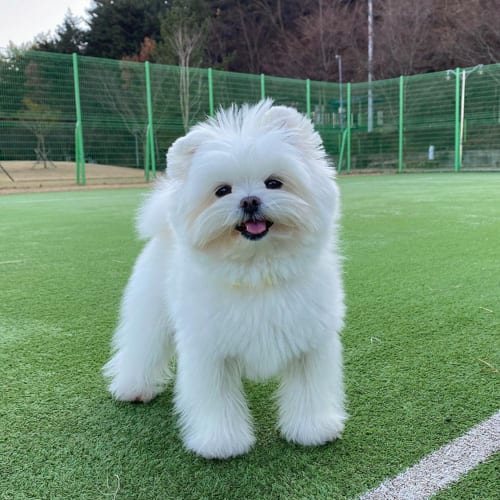Having a dog on your own can be both challenging and exciting. There are lots of things you need to consider before having one that is right for your lifestyle.
Deciding on the best dog suited for your lifestyle is necessary. It is because you can meet your dog’s needs if you are compatible with each other.
Tips in Choosing the Right Breed of Dog for your Lifestyle:

If you want to make sure that you can find the best small type of dog that would fit your lifestyle, then it would be better to take the following tips and considerations:
- Make your checklist: Write the things that you can do with your pet dog. Remember that your dog will soon be a part of your life. So, think clearly before getting committed to getting one.
- Size does matter: Consider the space that you have in your home. For small houses, small dogs are preferred. However, small dogs may sometimes need a bigger space to be more active and playful. They also need more exercise; therefore, occupying a larger space in your house.
- Dogs’ Training: Providing your dog with proper training is part of its discipline. It is beneficial if your dogs will be trained to behave properly in any situation, especially in socialization and getting new acquaintances. However, it will require patience, commitment, and passion for doing it. Training your dog does not happen overnight. It is a process for you to engage in.
- Veterinary Expenses: Taking care of a dog is expensive. It is just like raising your child. Consider the vaccines and other immunization will cost nowadays. Include also the accessories such as grooming, clothes, and others.
- A breed that you want: Are you planning to have a pure breed or a cross-breed? Think about first the breed of dog you want to have.
Best Small Dog Breeds

The type of small dog suited for you depends on the kind of lifestyle you have.
Here are some of the best small dog breeds for you to get familiar with while deciding your preferred dog.
- Boston Terrier: This is a traditional American dog that has dark-colored mixed with a white coat. He has large sparkling eyes. This is ideal to live in an apartment because of its size.
- Maltese: This dog has a soft and white coat that is silky. Maltese dogs require occasional exercise. Daily walk and playtime are enough for them.
- Poodle: It has a fancy coat because of its curly thick hair. It is an active dog and enjoys long walks.
- Shih Tzu: This dog has a tiny face with bright eyes. Shih Tzu is a friendly and jolly dog.
- Dachshund: It is a good-looking and amusing dog. It is often called the “wiener dogs.”
- Bichon Frise: It has a white and fluffy coat. It is an energetic dog; therefore, daily walks and regular playtime are good for them.
- Pug: This is one of the common dogs in the world. This dog has curly tails, wrinkled brows, and glimmering eyes.
- Chihuahua: This is identified as a tiny size dog. It has pointed ears and round eyes, which are so cute. According to the Central California Society for the Prevention of Cruelty to Animals (CCSPCA), regardless of their size, chihuahuas have the largest brain of any breed of dogs.
- Pomeranian: This dog has a fluffy coat and looks like a fox. It also has an eager grin.
- Yorkshire Terrier: It is also called “Yorkie.” It is also a common and popular breed of a small dog. It has a gray and tan coat that is silky and a fashionable dog.
Dog Breed Selector

This is a tool wherein you will be assisted in choosing the best small dog for your lifestyle.
It is important to use a dog breed selector because it will guide the selection process.
It will surely help you decide what kind of dog you should get depending on your personality and lifestyle.
It includes a quiz that you may answer. Finish the quiz for you to get the result.
From the result of your quiz, you can now know what kind of dog is right for you.
How to prepare to be a Responsible Dog Owners

Pet ownership comes to responsibility. To become a good owner of your small dog, you need to take the following responsibilities seriously. These will surely guide you in dealing with and taking care of your pet dog.
- Learn the value of commitment: Be sure to make an honest assessment of yourself. Can you take full commitment to your dog? Do you think you can carefully and seriously attend to his needs? Can you allot enough time taking care of your dog? These are just some of the few questions you have to consider when talking about commitment.
- Assess your lifestyle: Is the type of dog suited to the kind of lifestyle you have? What is your family’s life, such as activities, hobbies, likes, and dislikes, and even their personalities? You better check on these things so that both your family and your dog will enjoy each other’s company.
- Prepare a list: You can list down the qualities you want for a dog. You can do this after assessing your lifestyle. Consider the size of the dog and its basic needs.
- Choose a breed of dog: After listing down the ideal dog for yourself, you are now ready to pick your choice. Have some research on the type of dog suited to the ones you listed.
- Consult responsible dog owners: From their testimonies and sharing, you will surely learn how to manage well your chosen dog.
- Ask questions if you need to know something about your dog: Asking questions will help you better understand things.
- Wait for the right dog for you: Assuming that your ideal dog is not yet available, and then you better wait. Dog breeders do not breed dogs often. They also wait for the perfect timing.
- Be ready to commit as a dog owner: You can get it into writing, especially if you bought or adopted a dog. A contract is necessary for agreement, guarantees about health, terms of ownership or co-ownership, and other living arrangements. Include also in the agreement the basic information about the dog and the possible actions if the dog does not work out with you or with your family.
- Register your dog properly: Fill out and accomplish the required form for registration. Your dog will now be a part of the nation’s registry of purebred dogs. Aside from that, this allows your dog to become part of any events concerning them.
- Prepare the necessities for your dog: This includes toys, food, grooming tools, and other related accessories.
- Make a schedule: This schedule will be assigned for food, walks, exercise, water, clean-up, and even grooming. If your dog is for the family, then other family members can take turns in taking care of the dog. Post on the wall their assigned task to remind them of their roles and functions as co-owners of the dog.
- Secure your house (dog-proof): Prepare in advance your house before the coming of the dog. Check if there is no electrical cord that will bring curiosity to the dog. Secure the places where they should be off-limits.
- Provide a comfortable bed for your dog: It can be a crate, dog bed, or blankets. This is to ensure that your dog will have a place for rest or privacy.
- Choose a veterinarian: Do this ahead of time so that you can visit at once when your dog arrives. Provide your vet with the health record of the dog and other documents. Ask for a schedule of vaccination and regular check-ups.
- Give your dog enough time to adjust: At first, it is normal that your dog will feel insecure and frightened of people around him. However, with enough time, for sure, he can adjust to the new place. Show him the place where he should rest, eat, and play. Just leave him alone at first for him to explore the new environment.
- Give a name for your dog: There are many suggested dogs’ names on the internet. Check them out if you still don’t have a name for your dog.
- Use a house training method: Whatever method can do as long all family members are following it consistently. See to it that everyone is properly oriented.
- Set house rules: House rules are very important in establishing discipline in your dog. Orient him with the dos and donts. Consistency in implementing rules are always necessary for better result.
Roles and Responsibilities as Small Dog Owners

As dog owners, it is a must to know your roles and responsibilities. For you to make sure that you are properly doing these, then you may also refer to the following lists:
- Give your regular dog exercise. Check if your dog requires more exercise or not. Small dogs often require exercise to have more time outside. You can do simple walking and playing in the park or even in your lawn area if you have.
- Make a schedule of regular check-ups. Check-ups should be done regularly. It can be twice or once a year. This is to examine your dog for unwanted parasites and have a vaccine to boost his immune system. Good dental hygiene should also be given for proper care. This is to prevent any dental disease that may occur in your dog. If you need more ideas about dental care, you can check many online sources on the internet. However, if you notice that your dog needs to see a veterinary for possible reasons, you can bring it to the clinic anytime.
- Teach your dog to socialize. Socialization is getting new acquaintances. Since dogs are close to humans, better teach them how to gain friends and behave properly when surrounded by people.
- Feed your dog properly. A healthy diet is basic in taking care of dogs. Feed your dog according to its kind. Make a research on the food that is good for them. Pay attention also to those foods that might be dangerous for them. Be sure to have a proper place where they eat together with the utensils and other accessories needed. You can also consult a veterinarian for your dog’s proper feeding if you are not confident in doing your research.
- Provide security for your dog. Have the best security level at home. Taking care of your dog should also go hand in hand while taking care of your family and friends. Take necessary precautionary measures to ensure everyone’s safety. Add additional accessories for your dogs like nametags and microchips just in case they run away from home. Proper identification can always have your dog come back.
- Proper training and discipline should be taught to your dog. Training builds up trust and respect for both owners and the dog. Dogs are trainable; however, it requires patience and determination to learn proper behavior and tricks.
- Show lots of love to your dog. Everyone needs love and care. Dogs also need to be loved. When you show great love and affection to them, they will surely return those things to you. Dogs are lovable. Hence, you will find it easy to show love to your dog.
Regardless of the type of small dog you have, what matters most is how you value them.
Treating them well as your family member is necessary for them to develop companionship, among others. Remember, it does not require blood to be a family.
Therefore, treat your dog as a family. They will surely love and enjoy being with you and your whole family.
